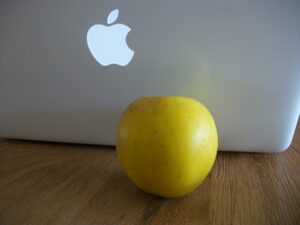 Legal Watch: Apple Corporation legal challenges to obtain full trademark rights on the generic “Granny Smith” Apple
Legal Watch: Apple Corporation legal challenges to obtain full trademark rights on the generic “Granny Smith” Apple
In 2017, the Swiss Institute of Intellectual Property (IPI) rejected Apple Corporation’s first trademark application for a novel Apple image. Following the decision, Apple filed multiple appeals for the proposed mark for use in several technological areas. These tech areas include digital and electronic consumer goods, audiovisual, video, new technologies, media, and cinematographic recordings. Apple then appealed to the Federal Administrative Court, which upheld the decision of the IPI and denied Apple’s novel logo, once again. In an attempt to overturn the verdict, Apple went as far as to handle this legal matter internationally to global IP legal professionals and court officials, which yielded mixed results. The Federal Institute for Intellectual Protection (IPI) 2022 decision highlighted how the multinational corporation proposed mark lacked the distinctive character necessary to claim protection. In other words, the image would not sufficiently identify and distinguish the designated goods or services, thus leading to confusion between similar marks. Eventually, in recognition of Apple Corp.’s rigorous efforts, IPI changed its verdict and granted partial rights to limited categories. However, in opposition to the court verdict, Apple filed another appeal in the spring of 2022. Apple aims for complete ownership and legal rights over the Apple image.
Apple Corporation’s novel mark consists of a black-and-white image of an apple similar to the Granny Smith apple. In 1868, the Granny Smith apple was discovered and became the most infamous green and sour apple from the orchard of Ryde, New South Wales, Australia, by farmer Maria Ann Smith (also known as Granny Smith). The Granny Smith Apple is renowned as one of the top five commercially grown fruits in the U.S. and the first variety of apples exported globally for sale in supermarkets. Given the generic nature, the apple image has been identified as a non-specific product in the public domain with no brand name or registered trademark. Throughout history and modern times, the apple served as a versatile icon. The apple image versatility displays through commercial sectors like the arts, retail stores, technology businesses, and entertainment. Due to the apple image’s generic nature, Apple Corporation’s claim creates controversy regarding the permissibility of a generic fruit registered as a tech corporation’s official trademark. Concerning legal matters pertaining to similarities between marks, the risk of confusion for consumers, the negative impact on local farm-growing businesses, and cases of infringement.
Along with certain court officials, Fruit Union Suisse Director Jimmy Mariethoz also expresses concerns about Apple Corp’s degree of action to gain the new Apple mark. In such a case, the corporation and worldwide businesses could result in impending events like forced alteration of logos, re-establishing business identities, and loss in revenue due to legal proceedings and charges. All this global detriment could happen due to one’s corporation’s desire to obtain something that was once a public shared commodity. In an attempt to protect its own apple mark, Fruit Union Suisse continues to voice opposition to this multinational corporation’s unwavering legal pursuit. Fruit Union Suisse is Switzerland’s oldest and largest fruit farmer’s organization. For many years, the association promoted Swiss fruit growers’ commercial interests. In addition, the association maintained its red apple emblem, adorned with a white cross. The association symbol is a representation of the country’s state flag. For the organization, a change of its mark is a decline in commercial operations, stripped of culture and tradition, and an erase of rights and freedoms.
As Apple’s claim for full rights to the image is unsettled, Intellectual Property professionals will closely monitor the court’s decision. The IPI’s decision could result in global economic and legal changes. In light of this new development, changes in the IP global landscape have placed corporations in positions that detail transformative aims to maintain a competitive advantage. Companies’ plans like business expansion, modifying products, and altering logos come with unforeseen results. Occasionally, one must take risks or thorough analysis for decision-making. Thus, there is much to consider in trademark protection and ownership pertaining to common goods. In addition, other apple image brand companies are likely to be significantly impacted. Overall, the visual representation or any advertisements of an apple is potentially affected.


 Legal Watch: Apple Corporation legal challenges to obtain full trademark rights on the generic “Granny Smith” Apple
Legal Watch: Apple Corporation legal challenges to obtain full trademark rights on the generic “Granny Smith” Apple